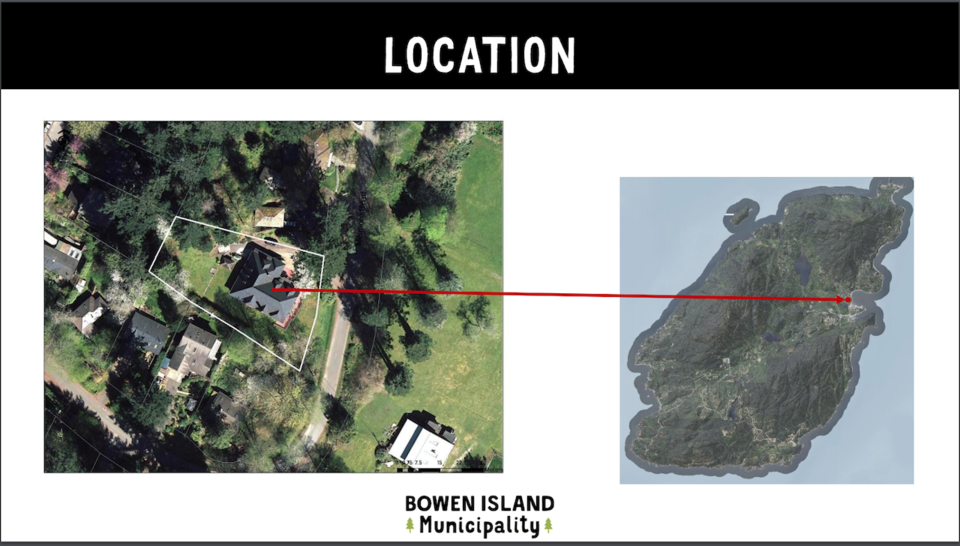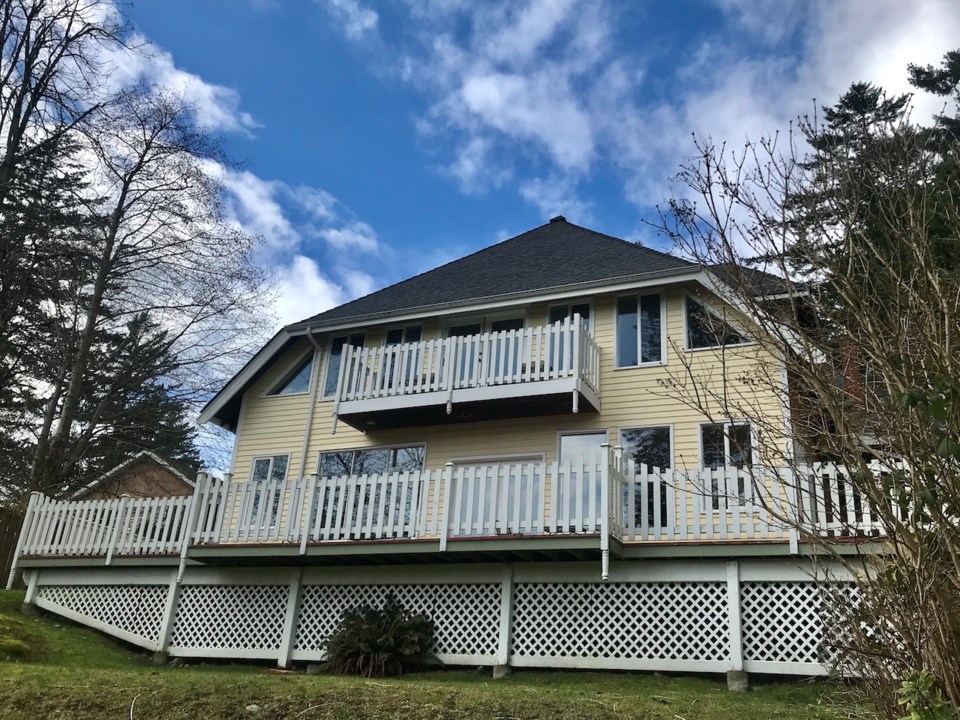Those hoping for resolution one way or the other for a community-dividing proposal were out of luck Monday evening.
Council voted to defer decision until April 14 of whether or not to issue Island Discovery Learning Community (IDLC) a temporary use permit that would allow the school to occupy Evergreen Hall in Deep Bay.
The decision was met with a chorus of groans from the standing room only audience.

What councillors had to say
Like the community, council was divided on the issue.
While they were in agreement on value of the IDLC program for Bowen, several councillors noted it wasn't the merits of IDLC being debated that night. Almost all voiced concern about the division in the Deep Bay community over the proposal.
Coun. Sue Ellen Fast said that she was tentatively opposed to the proposal as she would like to uphold the Official Community Plan’s long-term settlement planning and said she would welcome a rezoning application rather than a temporary use permit. “Land use patterns should be thought of over the long term and this is an established residential neighbourhood,” said Fast.
Coun. Maureen Nicholson said that she wasn’t comfortable with the use of a temporary use permit in this situation but that she recognized that it’s an important issue for IDLC. She noted that when the cannabis shop got its temporary use permit, there was the understanding that it would be applying for a rezoning and she said she’d be willing to support the proposal if there was an understanding that there would be a rezoning application.
Mayor Gary Ander, while he stood by his statement in the last council meeting that he believed IDLC benign and that it would be a good fit for Deep Bay, said he couldn’t ignore the letters before him.
“We’re very process driven here, totally process driven to make it fair and equitable,” said Ander. “If we go to a hundred metres around IDLC, unfortunately it’s quite negative.”
Ander said he wouldn’t be supporting the proposal.
Coun. Michael Kaile said that while a temporary use permit may be technically allowed in this situation, it’s hard for many to reconcile this use as “temporary.” He also said that the community is fractured, evidenced in the many emails and letters the municipality received.
“I would think from the school’s point of view, to start conducting business with this degree of opposition, would be an extremely uncomfortable proposition,” he said. “Because as several letters said, they’re frankly not welcome.”
Coun. Rob Wynen and Coun. David Hocking weren’t convinced by the traffic arguments.
Wynen said that he was impressed with IDLC’s traffic mitigation plan and general transportation approach, where a proponent said they wanted less parking and then gave a plan for how they were going to manage it. He also referenced his background as a Vancouver School Board Trustee and managing the safe streets to school program. “The fact of the matter is, the more people you put on the road, the safer it gets,” he said. A sentiment Hocking had shared earlier in the meeting.
However, both Hocking and Wynen also acknowledged that the noise for immediate neighbours is a concern. Wynen said he would support the proposal while Hocking said that he wanted to give the neighbourhood more time to come together and work through some of the issues.
After two hours of speakers, presentations and debate, council voted four to three (Kaile, Fast and Wynen against) to give residents of Deep Bay and IDLC more time to work toward consensus (though many voiced doubt this would happen.) Ander said he would like to see the community liaison group proposed as a condition of the temporary use permit formed and issues discussed before this matter comes back before council. It is due to come back to council April 14.
So what’s the proposal?
IDLC, a publicly funded organization (through the Powell River School District), which has been based at Cowan Pt. for the past decade, needs to move to a new location after the end of this school year. IDLC programs serve students from kindergarten to grade 12 and can have both homeschooling and classroom components (it’s also possible to just have supported homeschooling through the program). Currently, IDLC serves more than 40 students though not all in a classroom setting and not all at once. Deep Bay resident Andrew Schouten has offered to buy Evergreen Hall on Melmore Rd. for the school to use on the condition that the school gets all the necessary municipal permits. As the property has settlement residential zoning, IDLC applied for a three-year temporary use permit to allow “school” as a primary use. IDLC also applied for a development variance permit that would reduce the parking requirement from 32 on-site parking spots to six. IDLC would also require new building and occupancy permits for the building to reflect a school use and this would see occupancy capped at 30 people in the building at one time.
The proposal first came before council Feb. 10, when they voted to issue notice to Evergreen Hall’s neighbours that the permits would be considered at the March 9 meeting.
The controversy
Increased traffic on the narrow Deep Bay roads, pedestrian safety, noise, effects on property values, purported misuse of a temporary use permit, inadequate public process and short notice are among the concerns listed in the plethora of letters to council from Deep Bay residents. Manager of planning and development Daniel Martin told council that as of Monday afternoon, BIM had received 49 letters from Deep Bay residents with 19 households indicating support and 28 indicating opposition (some households saw multiple letters written, which is why the numbers don’t add up). The total letter count at that point (including letters from people outside of Deep Bay) was 95.
Some mitigation plans for these concerns are built into the conditions for the temporary use permit. IDLC has created a traffic management plan that would see students dropped off in the cove or on Miller Rd. and then walk in to the school as a condition of participation in the on-site program. Neighbours’ letters voice doubt as to whether parents would adhere to the plan on a rainy winter’s day, question the plan’s enforceability and voice concern that this would mean more kids walking on the narrow street with blind corners. One of the suggestions in Martin’s staff report to council is that should the permit pass, municipal bylaw officers or planning staff conduct periodic checks at drop-off and pick-up times to ensure folks are following the traffic management plan.
Conditions added since the permit last came before council include: building in hours of operation, 8 a.m. to 5 p.m. weekdays and summer break in July and August, with a maximum occupancy of six people in off hours; IDLC submitting a school schedule at the beginning of each term that guarantees there wouldn’t be more than 30 people on-site at once; and the creation of a community liaison group. The liaison group would be three Deep Bay residents unaffiliated with IDLC, two IDLC parents and one IDLC staff member.
One of the major points of contention is the nature of “temporary” in temporary use permit. Whereas a rezoning would trigger a lengthy public engagement process that could span years, a temporary use permit can pass in a matter of weeks or months. Many letters to council said that three years is not “temporary” and some questioned the legality of such a use of the permit. At least one letter to council said that should the proposal pass, this neighbour would pursue a legal challenge. Martin wrote in his staff report that the temporary use permit is not to authorize long-term use but to issue a permit for three years with the possibility of a one-time renewal, authorizing a use on a temporary basis for something that wouldn’t otherwise be allowed in the zoning. Martin said to council that part of the strength of a temporary use permit over a rezoning is that a permit can be revoked should permit conditions not be met.
Letters and speakers to council also noted that the short term frame had stirred up resentment, one speaker Monday evening said she felt that the proposal had been imposed quite suddenly on the community.
Letters in favour of issuing the permit noted that the school would be preserving a heritage building with minimal renovations (Union Steamship Company built the hall in 1941) and several welcomed the addition of more youth to the neighbourhood. Some letters also said that speeding is already an issue in the neighbourhood and that this proposal could come with a traffic calming plan. Some letters also suggested that there’s already increased foot traffic in the Deep Bay area and that a few more kids wouldn’t be noticeable. The walkability of the location––therefore reducing the carbon demands of several parents driving across the island to Cowan Pt. regularly––was too listed in letters as a benefit.
Martin wrote in his staff report that while several letters questioned the appropriateness of a school in an established residential neighbourhood, it is generally considered preferable to have elementary schools in particular located in residential neighbourhoods.



